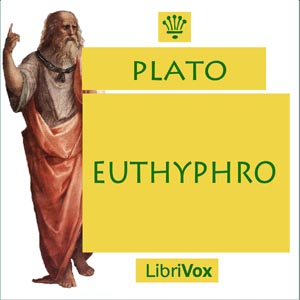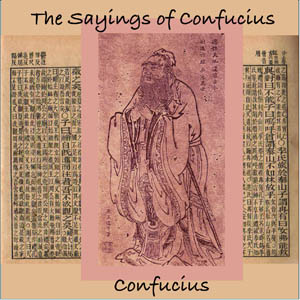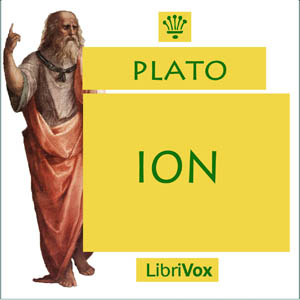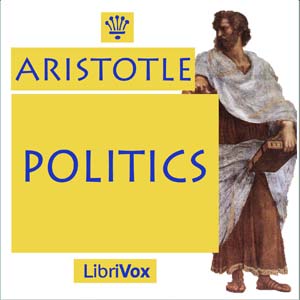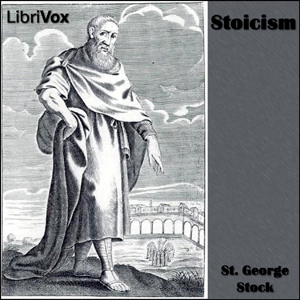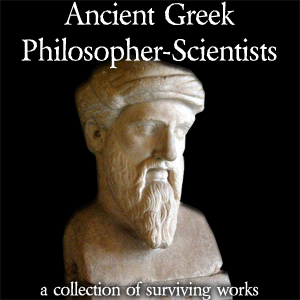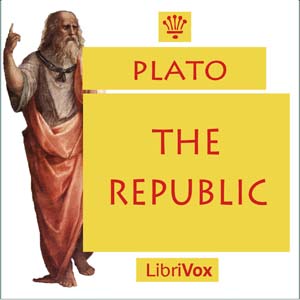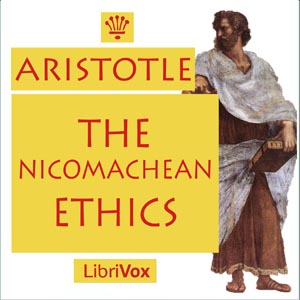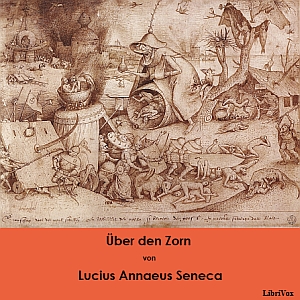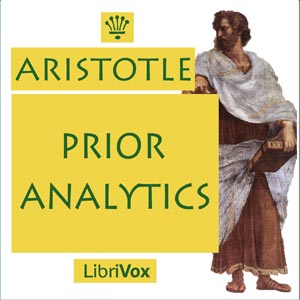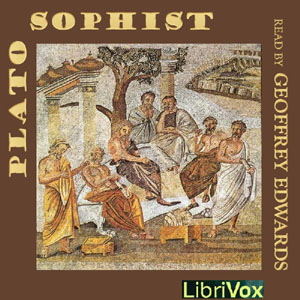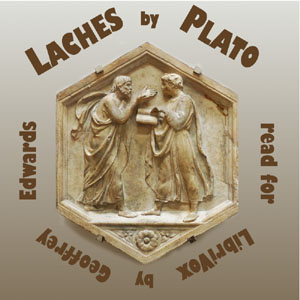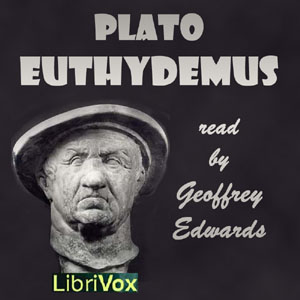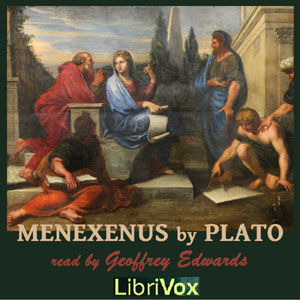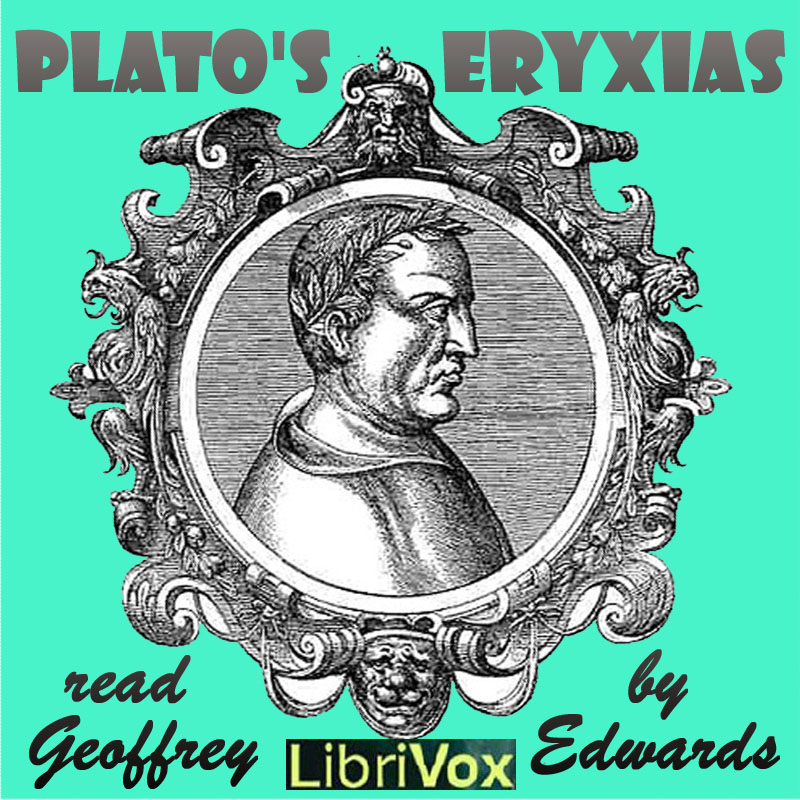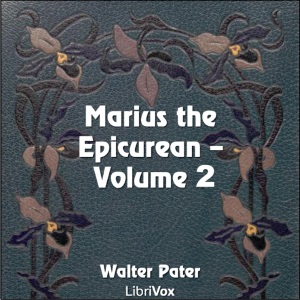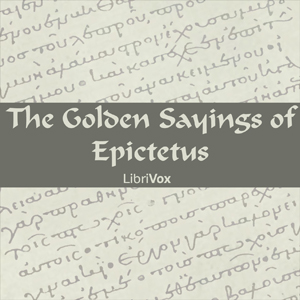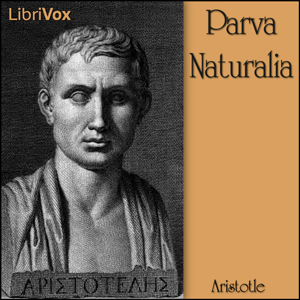Awaiting his trial on charges of impiety and heresy, Socrates encounters Euthyphro, a self-proclaimed authority on matters of piety and the will of the gods. Socrates, desiring instruction in these matters, converses with Euthyphro, but as usual, the man who professes to know nothing fares better than the man who claims to be an expert. One of Plato’s well-known Socratic Dialogues, Euthyphro probes the nature of piety, and notably poses the so-called Euthyphro Dilemma: Do the gods love a thing because it is holy, or is a thing holy because it is loved by the gods? (Summary by LauraFox)
1 episodes
Promoting virtues such as filial devotion, compassion, loyalty, and propriety, these dialogues between the ancient Chinese philosopher Confucius and his disciples comprise the crux of Confucianism. (Summary by Andrea L).
A Chinese version is available: 論語 Lún Yǔ (Analects)
21 episodes

At the Court of Liang at the period of Yang Chu, about 300 B.C., the philosophers were treated as guests of the reigning king, who reserved for them lodging and maintenance, and encouraged all who had any pretence to the pursuit of truth and wisdom. Whether or not Yang Chu was actually a native of the Wei State, or whether he came there drawn by the attraction of a critical and unrivalled audience, it is at least certain that he settled there as small proprietor, probably in the reign of King Hwei, and continued there till his death, about 250 B.C. One may imagine a condition of life in many respects somewhat analogous to the life of Epicurus in his famous Athenian Garden. To the philosopher of pleasure and contentment came pupils and disciples, discourses were held in much the same way as at an identical period discourses were held in the garden at Athens, and it is to these discourses, memorised and recorded by his favourite pupil Meng-sun-Yang, that we most probably owe the single fragment of the teaching of Yang Chu that remains, a fragment complete and explicit enough to enable us to form a clear estimate of his teaching and philosophy. - (from the Introduction by Hugh Cranmer-Byng)
2 episodes
The She-rab Dong-bu (Tree of Wisdom) is a metrical translation in Tibetan of a Sanscrit ethical work entitled Prajnya Danda, written by Nagarjuna who flourished in the fourth century of the Buddhist era (about 100 B.C.), The Tibetan version was probably made about the 11th century of our era but the exact date has not been determined. It is included in the Ten-gyur, ངོ་ section, volume གོ་, beginning at leaf 165. The Tibetan translator describes it as the second volume but I cannot say whether the remainder of the work has been preserved in Tibetan--the Sanscrit original is apparently lost. - W.L. Campbell
8 episodes
In Plato's ION, Socrates questions Ion, whether he should really claim laud and glory for his 'rhapsodic' recitals of Homer's poetry.
—Description by Simon-Peter Zak
2 episodes
Although Lieh Tzu's work has evidently passed through the hands of many editors and gathered numerous accretions, there remains a considerable nucleus which in all probability was committed to writing by Lieh Tzu's immediate disciples, and is therefore older than the genuine parts of Chuang Tzu. There are some obvious analogies between the two authors, and indeed a certain amount of matter common to both; but on the whole Lieh Tzu's book bears an unmistakable impress of its own. The geniality of its tone contrasts with the somewhat hard brilliancy of Chuang Tzu, and a certain kindly sympathy with the aged, the poor and the humble of this life, not excluding the brute creation, makes itself felt throughout. - From Lionel Giles Introduction
8 episodes
The Politics, by the ancient Greek philosopher Aristotle, is one of the most influential texts in political philosophy. In it, Aristotle explores the role that the political community should play in developing the virtue of its citizens. One of his central ideas is that "Man is a political animal," meaning that people can only become virtuous by active participation in the political community. Aristotle also criticizes his teacher Plato, classifies and evaluates six different types of constitutions and political institutions, and describes his vision of the ideal state. Aristotle's views on women and slavery are unenlightened by today's standards, but his work remains enduring and relevant to this day. (Summary by Leon Mire)
30 episodes
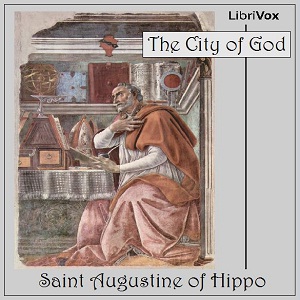
Rome having been stormed and sacked by the Goths under Alaric their king, the worshippers of false gods, or pagans, as we commonly call them, made an attempt to attribute this calamity to the Christian religion, and began to blaspheme the true God with even more than their wonted bitterness and acerbity. It was this which kindled my zeal for the house of God, and prompted me to undertake the defence of the city of God against the charges and misrepresentations of its assailants. This work was in my hands for several years, owing to the interruptions occasioned by many other affairs which had a prior claim on my attention, and which I could not defer.
However, this great undertaking was at last completed in twenty-two books. Of these, the first five refute those who fancy that the polytheistic worship is necessary in order to secure worldly prosperity, and that all these overwhelming calamities have befallen us in consequence of its prohibition. In the following five books I address myself to those who admit that such calamities have at all times attended, and will at all times attend, the human race, and that they constantly recur in forms more or less disastrous, varying only in the scenes, occasions, and persons on whom they light, but, while admitting this, maintain that the worship of the gods is advantageous for the life to come. In these ten books, then, I refute these two opinions, which are as groundless as they are antagonistic to the Christian religion.
But that no one might have occasion to say, that though I had refuted the tenets of other men, I had omitted to establish my own, I devote to this object the second part of this work, which comprises twelve books, although I have not scrupled, as occasion offered, either to advance my own opinions in the first ten books, or to demolish the arguments of my opponents in the last twelve. Of these twelve books, the first four contain an account of the origin of these two cities—the city of God, and the city of the world. The second four treat of their history or progress; the third and last four, of their deserved destinies. And so, though all these twenty-two books refer to both cities, yet I have named them after the better city, and called them The City of God. (Summary by the author in his Retractationes (ii. 43) as translated by Marcus Dods)
69 episodes
This short book is part of the Philosophies Ancient and Modern series, which attempts to make Western philosophy more accessible to the general public.In this volume, George Stock provides a concise primer on Stoicism, the ancient philosophy that maintained that the universe is governed entirely by fate, and that humans can achieve happiness only by cultivating a calm acceptance of the vicissitudes of life. Among the Stoics of the Greek and Roman world were its founder, Zeno, the former slave Epictetus, and the Roman emperor Marcus Aurelius. George Stock discusses not only the Stoic ethics, but also less well-known aspects of Stoicism, such as its division of the branches of philosophy, its account of logic, and its natural philosophy.
(Summary by Leon Mire)
6 episodes
« Je ne sais, Athéniens, quelle impression mes accusateurs ont faite sur vous. Pour moi, en les entendant, peu s’en est fallu que je ne me méconnusse moi-même, tant ils ont parlé d’une manière persuasive ; et cependant, à parler franchement, [...] ils n’ont pas dit un mot qui soit véritable ; et de ma bouche vous entendrez la vérité toute entière, ... » (de « L'apologie de Socrate »)
How you have felt, O men of Athens, at hearing the speeches of my accusers, I cannot tell; but I know that their persuasive words almost made me forget who I was - such was the effect of them; and yet [...] they have hardly uttered a word, or not more than a word, of truth; but you shall hear from me the whole truth... (from "Socrates' Defense" on Wikipedia)
An English version is available: The Apology of Socrates.
A German version is available: Des Sokrates Verteidigung.
7 episodes
The Pre-Socratic Greek philosophers, that is, the philosopher-scientists who lived before or contemporaneously to Socrates, were the first men in the Western world to establish a line of inquiry regarding the natural phenomena that rejected the traditional religious explanations and searched for rational explanations. Even though they do not form a school of thought, they can be considered the fathers of philosophy and many other sciences as we have them now. None of their works is extant, so, in this collection, we present the textual fragments, when existing, of ten Pre-Socratic philosopher-scientists, and quotations and testimonials about them left by later authors. (Summary by Leni)
10 episodes
The Republic is a Socratic dialogue by Plato, written in approximately 380 BC. It is one of the most influential works of philosophy and political theory, and arguably Plato's best known work. In it, Socrates and various other Athenians and foreigners discuss the meaning of justice and whether the just man is happier than the unjust man by constructing an imaginary city ruled by philosopher-kings. The dialogue also discusses the nature of the philosopher, Plato's Theory of Forms, the conflict between philosophy and poetry, and the immortality of the soul. (Summary from Wikipedia)
41 episodes

Apollonius of Tyana (ca. 40-120 AD) was a Greek Pythagorean philosopher and teacher. He hailed from the town of Tyana in the Roman province of Cappadocia in Asia Minor. His date of birth is a matter of conjecture as some say he was roughly a contemporary of Jesus.
After Apollonius' death his name remained famous among philosophers and occultists. In a "novelistic invention" inserted in the Historia Augusta, Aurelian, at the siege of Tyana in 272, was said to have experienced a visionary dream in which Aurelian claimed to have seen Apollonius speak to him, beseeching him to spare the city of his birth. In part, Aurelian said that Apollonius told him "Aurelian, if you desire to rule, abstain from the blood of the innocent! Aurelian, if you will conquer, be merciful!"
By far the most detailed source is the Life of Apollonius of Tyana, a lengthy, novelistic biography written by the sophist Philostratus at the request of empress Julia Domna. Philostratus’ account shaped the image of Apollonius for posterity and still dominates discussions about him in our times. To some extent it is a valuable source because it contains data from older writings which were available to Philostratus but disappeared later on. Many think that it is full of obviously fictitious stories and dialogues. Modern Christian scholars challenge its credibility in many regards. They dismiss most of it as pure invention.
One of the essential sources Philostratus claimed to know are the memoirs or diary of Damis, an alleged disciple and companion of Apollonius. Some scholars believe the notebooks of Damis are an invention of Philostratus. In any case it is a literary fake. Philostratus describes Apollonius as a wandering teacher of philosophy and miracle worker who was active in Italy, Spain and Ethiopia and even travelled to Mesopotamia, Arabia and India. In particular, he tells lengthy stories of Apollonius entering the city of Rome in disregard of emperor Nero’s ban on philosophers, and later on being summoned, as a defendant to the court of emperor Domitian where he defied the emperor in blunt terms.
Apollonius may have never left the Greek East. Many contend that he never came to Western Europe and was virtually unknown there till the third century AD when empress Julia Domna, who was herself an Easterner, decided to popularize him and his teachings in Rome. For that purpose she commissioned Philostratus to write the biography, where Apollonius is exalted as a fearless sage with supernatural powers, even greater than Pythagoras. Philostratus implies that upon his death, Apollonius of Tyana underwent heavenly assumption. Subsequently Apollonius was worshipped by Julia’s son emperor Caracalla and possibly also by her grand-nephew emperor Severus Alexander.
Two biographical sources earlier than Philostratus are lost: a book by emperor Hadrian’s secretary Maximus of Aegae describing Apollonius’ activities in the city of Aegae in Cilicia, and a biography by a certain Moiragenes. (Summary adapted from Wikipedia by Karen Merline)
43 episodes
Written in the first century b.C., On the Nature of Things (in Latin, De Rerum Natura) is a poem in six books that aims at explaining the Epicurean philosophy to the Roman audience. Among digressions about the importance of philosophy in men's life and praises of Epicurus, Lucretius created a solid treatise on the atomic theory, the falseness of religion and many kinds of natural phenomena. With no harm to his philosophical scope, the author composed a didactic poem of epic flavor, of which the imagery and style are highly praised. (Summary by Leni)
19 episodes
The Apology is Plato's version of the speech delivered by Socrates before the Athenian people in his defence agaist charges of impiety and of misleading others, which ended in his condemnation and death in 399 BC. It is the earliest and most eloquent expression of what has been termed 'philosophical faith', as that love and search for truth which gives meaning to life and trust in the face of death. (Summary by zaaf)
Ο Πλάτωνας ήταν σπουδαίος Έλληνας φιλόσοφος και συγγραφέας (427 π.Χ. - 347 π.Χ.), ο γνωστότερος μαθητής του Σωκράτη. Ο Πλάτων έγραψε την Απολογία του Σωκράτους, που θεωρείται ως μια σχετικά ακριβής καταγραφή της απολογίας του Σωκράτη στη δίκη που τον καταδίκασε σε θάνατο. (Summary by Wikipedia)
6 episodes
The Symposium (Ancient Greek: Συμπόσιον) is a philosophical book written by Plato sometime after 385 BCE. On one level the book deals with the genealogy, nature and purpose of love, on another level the book deals with the topic of knowledge, specifically how does one know what one knows. The topic of love is taken up in the form of a group of speeches, given by a group of men at a symposium or a wine drinking party at the house of the tragedian Agathon at Athens. Plato constructed the Symposium as a story within a story within a story. This architecture creates the space for Plato to build his philosophy of knowledge. The speech of Socrates points out that the highest purpose of Love is to become a Philosopher, or Lover of Wisdom. (Summary from Wikipedia)
3 episodes
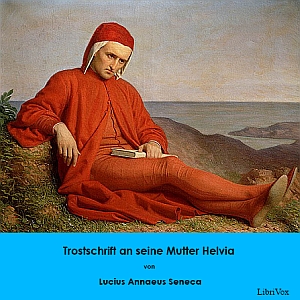
Veröffentlicht 1867.Lucius Annaeus Seneca, genannt Seneca der Jüngere, war ein römischer Philosoph, Dramatiker, Naturforscher, Staatsmann und als Stoiker einer der meistgelesenen Schriftsteller seiner Zeit.Ausschlaggebend für seinen weiteren Lebenslauf wurde das julisch-claudische Herrscherhaus im Jahre 41, als Seneca nach der Beseitigung des despotischen Caligula von dessen Nachfolger Claudius in die Verbannung nach Korsika geschickt wurde.Dies geschah auf Betreiben Messalinas, mit der Claudius in dritter Ehe verheiratet war und die Julia Livilla als potentielle Rivalin ausschalten wollte. Deshalb denunzierte sie diese wegen angeblichen Ehebruchs mit Seneca. Nur der Fürsprache Kaiser Claudius’ im Senat war es zu verdanken, dass Seneca statt zum Tode zur Verbannung nach Korsika verurteilt wurde. Weil dies in Form einer Relegatio (nicht der Deportation) geschah, blieben ihm Eigentum und staatsbürgerliche Rechte erhalten.Acht Jahre währte die Verbannung auf Korsika insgesamt. Erhalten sind aus dieser Zeit vor allem zwei Trostschriften, in denen Seneca einerseits stoischen Schicksalsgehorsam, andererseits aber auch den dringenden Wunsch nach Beendigung des Exils zum Ausdruck brachte. Er zeigte sich, indem er Trost spendete, zugleich als Trost Suchender in auf die Dauer quälender Abgeschiedenheit.In dem Trostschreiben an seine Mutter Helvia, die von seiner Verbannung hart getroffen worden war, versicherte Seneca, er sei nicht unglücklich auf Korsika und könne es auch gar nicht werden. (Zusammenfassung von Wikipedia)
4 episodes
The work consists of ten books, originally separate scrolls, and is understood to be based on notes said to be from his lectures at the Lyceum which were either edited by or dedicated to Aristotle's son, Nicomachus. In many ways this work parallels the similar Eudemian Ethics, which has only eight books, and the two works can be fruitfully compared. Books V, VI, and VII of the Nicomachean Ethics are identical to Books IV, V, and VI of the Eudemian Ethics. Opinions about the relationship between the two works, for example which was written first, and which originally contained the three common books, is divided. Aristotle describes his ethical work as being different from his other kinds of study, because it is not just for the sake of contemplating what things are, but rather to actually become good ourselves. It is therefore practical rather than theoretical in the original Aristotelian senses of these terms. (Summary from Wikipedia)
10 episodes
Kriton by Platon (428/427 v. Chr. – 348/347 v. Chr.). Übersetzung durch Friedrich Daniel Ernst Schleiermacher (1768-1834) von 1818.
Der Dialog Kriton schließt inhaltlich an die Apologie des Sokrates an und dokumentiert das Gespräch zwischen dem zum Tode verurteilten Philosophen Sokrates und dessen wohlhabendem Freund und Schüler Kriton, welcher ihn in seiner Zelle aufsucht. Sein Ziel ist es, Sokrates' Leben zu retten, indem er ihm zur Flucht aus dem Gefängnis verhilft. Dieses kann aber nur erreicht werden, wenn Sokrates von der Richtigkeit der Flucht überzeugt werden kann.
(Zusammenfassung von Wikipedia)
Personen:
Kriton: Christian Al-Kadi
Sokrates: redaer
1 episodes
Lucius Annaeus Seneca, genannt Seneca der Jüngere, war ein römischer Philosoph, Dramatiker, Naturforscher, Staatsmann und als Stoiker einer der meistgelesenen Schriftsteller seiner Zeit.
Seneca griff klassisches stoisches Gedankengut auf. Das Problem der Affektkontrolle wird hier auf vielfältige Weise lebenspraktisch, historisch-exemplarisch und politisch abgehandelt.
(Zusammenfassung von Wikipedia)
17 episodes
Prior Analytics is the third of Aristotle's six texts on logic which are collectively known as the Organon ("Instrument"). In Prior Analytics Aristotle conducts a formal study of arguments. In logic an argument is a series of true or false statements which lead to a true or false conclusion. Aristotle identifies valid and invalid forms of arguments called syllogisms. A syllogism is an argument consisting of three sentences: two premises and a conclusion. Of the entire Aristotelian corpus, Aristotle gives priority to the study of his treatises on Logic. (Adapted from Wikipedia)
17 episodes
Vairagya Shatakam is one of the best books that gives the true picture of Renunciation. The book talks on how a common man gets lured by the endless desires which when satisfied fetches him nothing but the desires again. It concludes saying how these unsatiable desires mislead the man from knowing his real nature-omnipotence, omnipresence and omniscience! (Summary by Uday Sagar)
11 episodes

On the Nature of Things, written in the first century BCE by Titus Lucretius Carus, is one of the principle expositions on Epicurean philosophy and science to have survived from antiquity. Far from being a dry treatise on the many topics it covers, the original Latin version (entitled De Rerum Natura) was written in the form of an extended poem in hexameter, with a beauty of style that was admired and emulated by his successors, including Ovid and Cicero. The version read here is an English verse translation written by William Ellery Leonard. Although Leonard penned his version in the early twentieth century, he chose to adhere to both the vocabulary and meter (alternating between pentameter and hexameter) of Elizabethan-era poetry.While the six untitled books that comprise On the Nature of Things delve into a broad range of subjects, including the physical nature of the universe, the workings of the human mind and body, and the natural history of the Earth, Lucretius repeatedly asserts throughout the work that his chief purpose is to provide the reader with a means to escape the "darkness of the mind" imposed by superstition and ignorance. To this end he offers us his enlightening verses, that through them might be revealed to us "nature's aspect, and her laws". (Summary by Daniel Vimont)
32 episodes
One of the greatest works of poetry in history, this lyric poem presents the deep feelings and emotions of the poet on subjects such as life, death, love, God and destiny. (Summary by Michael Armenta)
3 episodes
Parmenides (Ancient Greek: ΠΑΡΜΕΝΙΔΗΣ) recounts a meeting between Socrates, Zeno and Parmenides. Topics discussed include universals, plurality and the One. - Summary by Geoffrey Edwards
3 episodes
Theaetetus (Ancient Greek: Θεαίτητος) discusses concepts including perception, true judgment and knowledge. Socrates compares the human mind to a piece of wax and is critical of lawyers who seek only to persuade. (Summary by Geoffrey Edwards)
5 episodes
Sophist (Ancient Greek: Σοφιστής) discusses being and not-being while drawing a distinction between the philosopher and the sophist. - Summary by Geoffrey Edwards
3 episodes
Statesman (Ancient Greek: Πολιτικός) discusses God's role in maintaining the universe and describes the statesman as a good shepherd who promotes intermarriage between the orderly and courageous. (Summary by Geoffrey Edwards)
3 episodes
Philebus (ΦΙΛΗΒΟΣ) discusses pleasure, wisdom, soul and God. (Summary by Geoffrey Edwards)
3 episodes
Charmides (Χαρμίδης) discusses the virtue of temperance. (Summary by Geoffrey Edwards)
2 episodes
Der Stoiker Marc Aurel regierte von 161 bis 180 das römische Reich. In seinen Selbstgesprächen (Τὰ εἰς ἑαυτόν, wörtlich "an sich selbst") untersucht er seinen Charakter, seine Handlungen und seine Umwelt. Er entwickelt Ideen für ein besseres Leben. - Summary by redaer
12 episodes
Lysis (Λύσις) discusses friendship and love between the good and bad. (Summary by Geoffrey Edwards)
1 episodes
Laches (Λάχης) discusses examples of courage including weapons masters, soldiers who stand firm in battle, ferocious animals and the wise person who endures evils. (Summary by Geoffrey Edwards)
1 episodes
Euthydemus (Εὐθύδημος) and Dionysodorus the sophists discuss the meaning of words with Socrates. (Summary by Geoffrey Edwards)
2 episodes
Menexenus (ΜΕΝΕΞΕΝΟΣ) is thought to have been written by Plato (ΠΛΑΤΩΝ). The dialogue consists of Socrates (ΣΩΚΡΑΤΗΣ) recounting a funeral oration he claims to have learned from the female philosopher Aspasia (ΑΣΠΑΣΙΑ) who may have been wealthy, a courtesan or both. (Summary by Geoffrey Edwards)
1 episodes
Eryxias (ΕΡΥΞΙΑΣ) may not have been written by Plato (ΠΛΑΤΩΝ). The dialogue discusses whether wealth has value and what the aim of philosophy should be. (Summary by Geoffrey Edwards)
1 episodes
Opuscula is a collection of shorter books that may or may not have been written by Aristotle.
1. On Colours
2. On Things Heard
3. Physiognomonics
4. On Plants
5. On Marvellous Things Heard
6. Mechanics
7. On Indivisible Lines
8. The Situations and Names of Winds
9. On Melissus, Xenophanes, and Gorgias
- Summary by Geoffrey Edwards
14 episodes

The word Upanishad (upa-ni-shad) consists of, "Upa" means "near;" "ni" means "down;" "shad" means "to sit." Thus, Upanishad is to sit down near the teacher to discuss, learn, practice, and experience. There are some 200 or more Upanishads. Some are lost and are only known about because of being referenced in other Upanishads. Most of the Upanishads were kept secret for centuries, only passed on to others orally in the form of Shloka (a category of verse line developed from the Vedic Anustubh meter).Isha Upanishad is known by others names such as Ishavasya Upanisahd and Vagasaneyi-Samhita-Upanishad. This is one of the shortest Upanishads; a brief poem consisting of 18 verses. It forms the fortieth and concluding chapter of the Samhita of the White Yajur-veda.The word Isha (ईश) literally means "ruler, master, lord". The term vāsyam (वास्य) literally means "hidden in, covered with, enveloped by". The contested chronology of Isha Upanishads is between first or second half of first millennium BCE.The 11 principal Upanishads to which Sankara appeals in his great commentary on the Vedanta-Surtras are: Chandogya, Talavakara or Kena, Aitareya, Kaushitaki, Vajasaneyi or Isha, Katha, Mundaka, Taittirtiyaka or Taittiriya, Brihadaranyaka, Svetasvatara, and Prasna. They are also called the 11 classical Upanishads or the fundamental Upanishads of the Vedanta Philosophy. Apart from these, Maitrayana-Brahmana-Upanishad is also considered as an important Upanishad.
The Upanishadic literature is not a religious scripture and is free from dogma and doctrines. It is not a part of any religion but is a philosophy for all times and for all. German philosopher Arthur Schopenhauer, impressed by the Upanishads, called the texts "the production of the highest human wisdom". Summary by Jothi
1 episodes
The six Enneads (ΕΝΝΕΑΔΕΣ) are the collected writings of the Neoplatonic philosopher Plotinus (ΠΛΩΤΙΝΟΣ) arranged by his student Porphyry (ΠΟΡΦΥΡΙΟΣ) into fifty-four books with each Ennead containing nine. The translator Kenneth Sylvan Guthrie arranged these books chronologically rather than according to Porphyry's numeration. This recording is organized according to Porphyry's numeration with Roman numerals indicating the Ennead and Hindu-Arabic numerals indicating the book e.g. VI.9 would be the ninth book of the sixth Ennead. A hyperlinked table of contents at Volume 1 Page 3 of the gutenberg.org text will enable you to jump to the specific Ennead if you wish to read along with the recording. (Summary by Geoffrey Edwards)
91 episodes
This is the second volume of the Letters, Epistles LXVI-XCII. Among the personalities of the early Roman Empire there are few who offer to the readers of to-day such dramatic interest as does Lucius Annaeus Seneca, the author of the Epistles. These letters, written by Seneca towards the end of his life, are all addressed to his friend Lucilius, who, at the time when these letters were written, was a procurator in Sicily. The form of this work, as Bacon says, is a collection of essays rather than of letters. Summary paraphrased from the Introduction in Volume 1 by Suprad.
27 episodes
Definitions is a dictionary of 184 terms, originated in Plato’s Academy. Until late antiquity Plato was named as the author of this work, but in the anonymous Prolegomena to Platonic Philosophy, 10. 26. 4 Speusippus is mentioned as the author.
The 32 Epigrams are attributed to Plato and are short poems written in the form of elegiac couplets.
(Summary by Maria Sozopoulou)
Οἱ Ὅροι εἶναι ἕνα λεξικὸ μὲ 184 ὅρους, τὸ ὁποῖο προέρχεται ἀπὸ τὴν Πλατωνικὴ Ἀκαδημία. Μέχρι καὶ τὴν ὕστερη ἀρχαιότητα συγγραφέας τῶν Ὅρων θεωρεῖτο ὁ Πλάτων, ὅμως στὸ ἔργο τοῦ ἀνωνύμου Προλεγόμενα τῆς Πλάτωνος φιλοσοφίας, 10. 26. 4 ἀναφέρεται ὡς συγγραφέας ὁ Σπεύσιππος.
Τὰ 32 Ἐπιγράμματα ἀποδίδονται στὸν Πλάτωνα. Πρόκειται γιὰ μικρὰ ποιήματα γραμμένα σὲ ἐλεγειακὸ δίστιχο.
33 episodes
François Fénelon became a priest in 1675, Archbishop of Paris in 1679, was spiritual advisor to Madame Guyon, and was appointed tutor to Louis, Duke of Burgundy (1682-1712) by Louis XIV in 1689. He wrote Dialogues of the Dead, and The Lives of the Ancient Philosophers as well as The Adventures of Telemachus expressly for his instruction. Fenelon wrote against the Jansenists and in favor of the Jesuits. He is also known for his Christian Perfection: Devotional Reflections on the Christian Life and Treatise on the Education of Girls.. - Summary by Wikipedia
31 episodes
Lao-Tzu, also known as Laozi was a Chinese philosopher believed to have lived in the 6th century BCE and is credited with writing the Tao-Te-Ching which centers around the idea that the way of virtue lies in simplicity and a recognition of a natural, universal force known as the Tao. He is traditionally regarded as the founder of Taoism. This book is a compilation of his most profound writings translated directly from ancient Chinese texts. - Summary by Nemo
10 episodes
The conclusion of Pater's historico-philosophical novel about a young Roman nobleman's search for purpose and meaning. Set in the time of Caesar Marcus Aurelius Antoninus, the book traces its title character's encounters with the stoicism of Aurelius, Eastern philosophical and religious movements, and Christianity as they reacted with Marius's own innate Epicureanism.
In exploring these issues, Pater focuses on themes of adult development, as he notes the impact of Marius's childhood experiences as they inform his adult thinking; the value of the aesthetic life (a favorite idea of Pater's); and the appeal of religion.
In addition, the work is stylistically distinct for its attempt to use classical historical and philosophical texts
to support and enrich a fictional narrative.
(DrPGould with help from Wikipedia)
14 episodes

Tirukkural (holy couplet) is believed to be written more than 2000 years ago by sage Thiruvalluvar.This is a metric translation by Rev. G.U.Pope, who says, "In regard to the translation, I may venture to say that it is faithful, and that I have not read into the rendering a single idea or thought which there were not good grounds for supposing that the poet intended to convey. I thought it best to try to give a metrical translation. The Tamil scholar will see that I have tried to reproduce even the rhythm in many cases, but I could not retain the inimitable grace, condensation, and point of the original."The Kural has influenced several luminaries including Leo Tolstoy, Mahatma Gandhi, and Albert Schweitzer.The Kural is hailed for its lofty wisdom. It is said that the Kural contains all things and there is nothing that it does not contain.This is apparent from the following list of chapter headings of this work (The chapter numbers are prefixed.)VIRTUE1-The praise of god, 2-The excellence of rain, 3-The greatness of ascetics, 4-Assertion of the strength of virtue - domestic life, 5-Domestic life, 6-The goodness of the help to domestic life, 7-The obtaining of sons, 8-The possession of love, 9-Cherishing guests, 10-The utterance of pleasant words, 11-The knowledge of benefits conferred-gratitude, 12-Impartiality, 13-The possession of self-restraint, 14-The possession of decorum, 15-Not coveting another's wife, 16-The possession of patience - forbearance, 17-Not envying, 18-Not coveting, 19-Not backbiting, 20-The not speaking profitless words, 21-Dread of evil deeds, 22-The knowledge of what is befitting a man's position, 23-Giving, 24-Renown, 25-The possession of benevolence, 26- The renunciation of flesh - penance, 27-Penance, 28-Inconsistent conduct, 29-The absence of fraud,30-Veracity, 31-The not being angry, 32-Not doing evil, 33-Not killing, 34-Instability, 35-Renunciation, 36-Knowledge of the true, 37-The extirpation of desire, 38-Fate,WEALTH39-The greatness of a king, 40-Learning, 41-Ignorance, 42-Hearing, 43-The possession of knowledge, 44-The correction of faults, 45-Seeking the aid of great men, 46-Avoiding mean associations, 47-Acting after due consideration, 48-The knowledge of power, 49-Knowing the fitting time, 50-Knowing the place, 51-Selection and confidence, 52-Selection and employment, 53-Cherishing one's kindred, 54-Unforgetfulness, 55-The right sceptre, 56-The cruel sceptre, 57-Absence of terrorism, 58-Benignity, 59-Detectives, 60-Energy, 61-Unsluggishness, 62-Manly effort, 63-hopefulness in trouble, 64-the office of minister of state, 65-power in speech, 66-purity in action, 67-Power in action, 68-The method of acting, 69-The envoy, 70-Conduct in the presence of the king, 71-The knowledge of indications, 72-The knowledge of the council chamber, 73-Not to dread the council, 74-The land, 75-The fortification, 76-Way of accumulating wealth, 77-The excellence of an army, 78-Military spirit, 79-Friendship, 80-Investigation in forming friendships, 81-Familiarity, 82-Evil friendship, 83-Unreal friendship, 84-Folly, 85-Ignorance, 86-Hostility, 87-The might of hatred, 88-Knowing the quality of hate, 89-Enmity within, 90-Not offending the great, 91-Being led by women, 92-Wanton women, 93-Not drinking palm-wine, 94-Gaming, 95-Medicine, 96-Nobility, 97-Honour, 98-Greatness, 99-Perfectness, 100-Courtesy, 102-Shame, 103-The way of maintaining the family, 104-Agriculture, 105-Poverty, 106-Mendicancy, 107-The dread of mendicancy, 108-Baseness,LOVE109-Mental disturbance caused by the beauty of the princess, 110-Recognition of the signs (of mutual love), 111-Rejoicing in the embrace, 112-The praise of her beauty, 113-Declaration of love's special excellence, 114-The abandonment of reserve, 115-The announcement of the rumour, 116-Separation unendurable, 117-Complainings, 118-Eyes consumed with grief, 119-The pallid hue, 120-The solitary anguish, 121-Sad memories, 122-The visions of the night, 123-Lamentations at eventide, 124-Wasting away, 125-Soliloquy, 126-Reserve overcome, 127-Mutual desire, 128-The reading of the signs, 129-Desire for reunion, 130-Expostulation with oneself, 131-Pouting, 132-Feigned anger, 133-The pleasures of temporary variance.You can pick a chapter heading of interest and listen to the audio for that chapter. For instance, if you are interested in the chapter "Feigned anger" (which is chapter 132), you can listen to the audio for chapter 132. Summary by Jothi.
133 episodes
On the Parts of Animals (Greek: ΠΕΡΙ ΖΩΩΝ ΜΟΡΙΩΝ; Latin: De Partibus Animalium) by Aristotle (ΑΡΙΣΤΟΤΕΛΗΣ). The first book asks whether animals were designed or came into existence by chance. The remaining three books focus on particular examples of various animals and the functions of their organs. The translator William Ogle, who was both a medical doctor and classicist, presented Charles Darwin with a copy of this translation. (Adapted from Wikipedia by Geoffrey Edwards)
10 episodes
The Elements of Theology (ΣΤΟΙΧΕΙΩΣΙΣ ΘΕΟΛΟΓΙΚΗ) was written by the Greek Neoplatonist philosopher Proclus (ΠΡΟΚΛΟΣ) and translated by Thomas Taylor who named his youngest son Thomas Proclus Taylor. This book consists of 211 propositions, each followed by a proof, beginning from the existence of the One (divine Unity) and ending with the descent of individual souls into the material world. Saint Thomas Aquinas recognized that the Liber de Causis (Book of Causes), which had been attributed to Aristotle, was actually a summary of the Elements of Theology, likely written by an Arabic interpreter. - Summary adapted from Wikipedia by Geoffrey Edwards
18 episodes
Theophrastus ( c. 371 – c. 287 BC) was an ancient Greek philosopher, successor to Aristotle in the Peripatetic School. He wrote on many topics: biology, geology, physics, metaphysics, psychology, ethics, logic – and more. His book Characters… contains thirty brief, vigorous, and trenchant outlines of moral types, which form a most valuable picture of the life of his time, and in fact of human nature in general. They are the first recorded attempt at systematic character writing. “Apart from slight variations of local coloring and institutions, the descriptions of the old Greek philosopher might apply almost as well to the present inhabitants of London or Boston as to the Athenians of 300 B.C.” This edition contains an extensive and informative introduction to the man and his thought. - Summary by Book Introduction, Wikipedia, and David Wales
4 episodes
